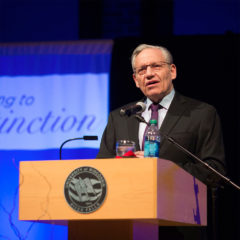Bob Woodward reveals presidential history
May 8, 2014
Friday, May 2, was the third annual UW-River Falls Rising to Distinction Scholarship Benefit with a keynote address featuring Pulitzer Prize-winning writer, Bob Woodward.

Woodward is an assistant managing editor for the Washington Post where he has worked since 1971. According to his website, he won his first Pulitzer along with many other American journalism awards for his reporting on the Watergate scandal. His second Pulitzer win was for his reporting on the aftermath of the September 11, 2001, terrorist attacks.
“Having this year being the 40th anniversary of the Watergate break-in seemed to make it the right time for Bob Woodward,” said Chris Mueller, assistant chancellor of University Advancement and president of UWRF Foundation.
Mueller said that Woodward has about 20 speaking engagements a year, so the University was lucky and thankful that they were able to have him come to campus for the benefit.
Woodward spoke to approximately 394 audience members Friday night in the Abbott Concert Hall in the Kleinpell Fine Arts building about his journey as a journalist and his 17 books, as well as his experience interviewing and reporting on eight presidents.
“It’s hard to find out what really goes on; in other words, everyone puts out smoke screens. The message managers now in the White House, any institution, in Congress, try to control things and they have more authority and there are more of them and they’re more insistent. You call the White House and you say ‘I’d like to ask about this,’ if you are a regular reporter, and the first thing you get back from the White House is ‘why is that a story?’ trying to discourage coverage,” Woodward said. “So, it takes a lot of time.”
Mueller said that the development committee of the foundation board spends 12 to 14 months working on the next speaker for the Scholarship Benefit. The event’s proceeds support the Falcon Scholars Program that currently has a campaign to raise $20 million by June 30, 2016. Bill Boehm, campaign chair, gave a campaign progress report during the event. As of March 31, 2014, a total of $15.012 million has been received in pledges and donations.
“The comments this year were very positive from those who attended,” Mueller said. “Some times you don’t know what you’re going to get when the person shows up and I thought that his presentation was really fabulous because he went through 40 years of presidential history.”
Mueller said that Woodward hit a mark and really told stories that audience members may not have heard or read otherwise in the news. He said that the way Woodward linked together the different U.S. presidents that he covered over four decades was intriguing.
Woodward said that while there are difficulties being in journalism, there are also perks.
“Being a journalist is the best job in the world,” Woodward said. “If somebody came from Mars and spent a year in the United States, went back to Mars and they were asked by other Martians who in the United States has the best job? They’d say the journalists because we get to make momentary entries into peoples’ lives when they’re interesting and get the hell out when they cease to be interesting.”
